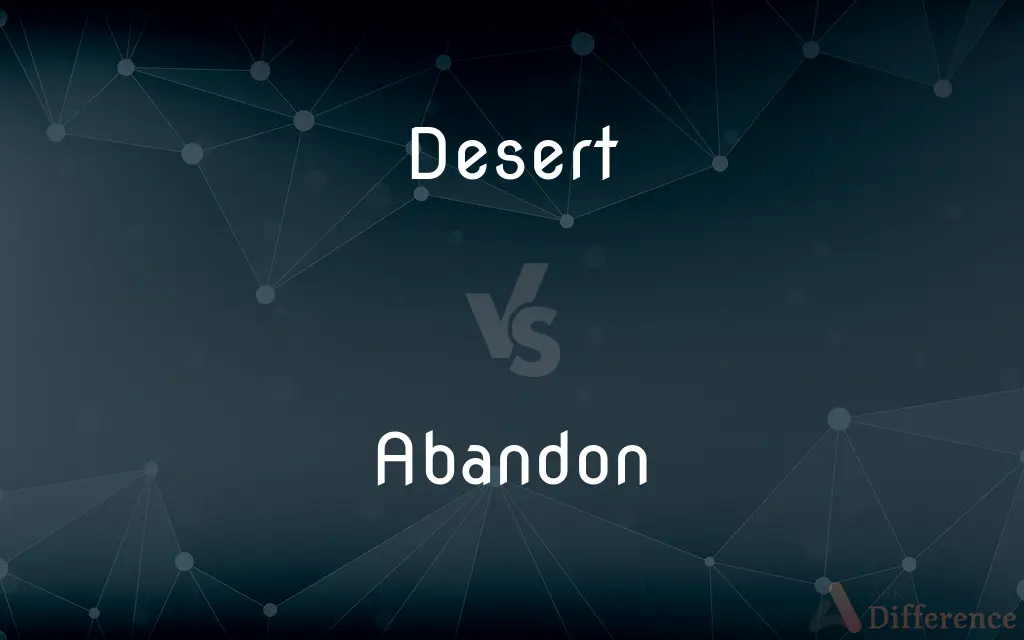Desert vs. Abandon — What's the Difference?
By Tayyaba Rehman & Maham Liaqat — Updated on April 1, 2024
Desert implies leaving a duty or position without permission, especially in military contexts, while abandon means to give up on or cease to support someone or something entirely.

Difference Between Desert and Abandon
Table of Contents
ADVERTISEMENT
Key Differences
Deserting often refers to a specific legal and military act of leaving one’s post or duty without permission, typically carrying serious penalties. On the other hand, abandoning involves ceasing to support or look after someone or something, which can apply in a wide range of contexts from personal relationships to projects or properties.
While desertion is seen as a betrayal or failure to fulfill obligations, particularly in a military context, abandonment can be perceived as relinquishing responsibility or care, indicating a broader scope of application including emotional, financial, and physical aspects.
The act of deserting is typically driven by a desire to escape from an unbearable situation, such as conflict or duty, without regard to legal or moral obligations. Conversely, abandonment might stem from a variety of reasons including loss of interest, necessity, or a decision that continuing effort is futile, thus encompassing a wider emotional and rational spectrum.
Legal consequences are more specifically associated with desertion, especially in the military, where it is considered a criminal act. Abandonment, while it can also carry legal ramifications, especially in familial and property contexts, is generally less strictly defined and can be subject to broader interpretation.
The emotional impact of desertion is often tied to feelings of betrayal and abandonment, but the term specifically highlights the violation of duty or oath. In contrast, the emotional toll of abandonment can range widely depending on the context, from personal loss and grief to relief or indifference, reflecting its diverse applications.
ADVERTISEMENT
Comparison Chart
Definition
Leaving a duty or position without permission
Ceasing to support someone or something
Context
Primarily military and legal
Broad, including personal, legal, and emotional
Legal Consequences
Often severe, specifically defined
Can vary, less strictly defined
Emotional Impact
Betrayal, guilt, loss of honor
Loss, relief, guilt, depending on context
Reasons
Escape from duty, conflict avoidance
Loss of interest, necessity, deemed futile
Compare with Definitions
Desert
Often involves evasion.
The soldier deserted, hoping to evade the coming battle.
Abandon
Emotional context.
Abandoning the old house felt like leaving a part of their past behind.
Desert
Seen as betrayal.
Deserting his comrades in their time of need was seen as an act of betrayal.
Abandon
Legal and personal ramifications.
Abandoning property can lead to legal consequences and loss of ownership.
Desert
Leaves duty unfulfilled.
By deserting, he left his responsibilities unattended and his team in jeopardy.
Abandon
Can be a relief.
Abandoning the failing project was a relief to the team.
Desert
Military context.
He was charged with desertion after leaving his post without authorization.
Abandon
Ceasing support.
The project was abandoned due to a lack of funding.
Desert
Legal repercussions.
Deserting during wartime is subject to severe legal consequences.
Abandon
Varied reasons.
They had to abandon their home due to the encroaching wildfire.
Desert
A desert is a barren area of landscape where little precipitation occurs and, consequently, living conditions are hostile for plant and animal life. The lack of vegetation exposes the unprotected surface of the ground to the processes of denudation.
Abandon
To withdraw one's support or help from, especially in spite of duty, allegiance, or responsibility; desert
Abandon a friend in trouble.
Desert
Abandon (a person, cause, or organization) in a way considered disloyal or treacherous
We feel our public representatives have deserted us
Abandon
To give up by leaving or ceasing to operate or inhabit, especially as a result of danger or other impending threat
Abandoned the ship.
Desert
A waterless, desolate area of land with little or no vegetation, typically one covered with sand
The desert of the Sinai peninsula is a harsh place
Drought and deforestation are turning fragile grasslands into desert
Abandon
To surrender one's claim to, right to, or interest in; give up entirely
Abandon a belief.
Desert
A flock of lapwings
A desert of lapwings rises from a ploughed field
Abandon
To cease trying to continue; desist from
Abandoned the search for the missing hiker.
Desert
Like a desert
Overgrazing has created desert conditions
Abandon
To yield (oneself) completely, as to emotion.
Desert
A dry, often sandy region of little rainfall, extreme temperatures, and sparse vegetation.
Abandon
Great enthusiasm or lack of restraint
Skied with abandon.
Desert
A region of permanent cold that is largely or entirely devoid of life.
Abandon
(transitive) To give up or relinquish control of, to surrender or to give oneself over, or to yield to one's emotions.
Desert
An apparently lifeless area of water.
Abandon
(transitive) To desist in doing, practicing, following, holding, or adhering to; to turn away from; to permit to lapse; to renounce; to discontinue.
Desert
An empty or forsaken place; a wasteland
A cultural desert.
Abandon
(transitive) To leave behind; to desert, as in a ship, a position, or a person, typically in response to overwhelming odds or impending dangers; to forsake, in spite of a duty or responsibility.
Many baby girls have been abandoned on the streets of Beijing.
She abandoned her husband for a new man.
Desert
(Archaic) A wild and uninhabited region.
Abandon
To subdue; to take control of.
Desert
Often deserts Something that is deserved or merited, especially a punishment
They got their just deserts when the scheme was finally uncovered.
Abandon
To cast out; to banish; to expel; to reject.
Desert
The state or fact of deserving reward or punishment.
Abandon
(transitive) To no longer exercise a right, title, or interest, especially with no interest of reclaiming it again; to yield; to relinquish.
I hereby abandon my position as manager.
Desert
Of, relating to, characteristic of, or inhabiting a desert
Desert fauna.
Abandon
(transitive) To surrender to the insurer (an insured item), so as to claim a total loss.
Desert
Wild and uninhabited
A desert island.
Abandon
A yielding to natural impulses or inhibitions; freedom from artificial constraint, with loss of appreciation of consequences.
Desert
To leave empty or alone; abandon.
Abandon
(obsolete) abandonment; relinquishment.
Desert
To withdraw from, especially in spite of a responsibility or duty; forsake
Deserted her friend in a time of need.
Abandon
To cast or drive out; to banish; to expel; to reject.
That he might . . . abandon them from him.
Being all this time abandoned from your bed.
Desert
To abandon (a military post, for example) in violation of orders or an oath.
Abandon
To give up absolutely; to forsake entirely ; to renounce utterly; to relinquish all connection with or concern on; to desert, as a person to whom one owes allegiance or fidelity; to quit; to surrender.
Hope was overthrown, yet could not be abandoned.
Desert
To forsake one's duty or post, especially to be absent without leave from the armed forces with no intention of returning.
Abandon
Reflexively: To give (one's self) up without attempt at self-control; to yield (one's self) unrestrainedly; - often in a bad sense.
He abandoned himself . . . to his favorite vice.
Desert
That which is deserved or merited; a just punishment or reward.
Abandon
To relinquish all claim to; - used when an insured person gives up to underwriters all claim to the property covered by a policy, which may remain after loss or damage by a peril insured against.
Desert
A barren area of land or desolate terrain, especially one with little water or vegetation; a wasteland.
Abandon
Abandonment; relinquishment.
Desert
(figuratively) Any barren place or situation.
Abandon
A complete giving up to natural impulses; freedom from artificial constraint; careless freedom or ease.
Desert
Usually of a place: abandoned, deserted, or uninhabited.
They were marooned on a desert island in the Pacific.
Abandon
The trait of lacking restraint or control; freedom from inhibition or worry;
She danced with abandon
Desert
To leave (anything that depends on one's presence to survive, exist, or succeed), especially when contrary to a promise or obligation; to abandon; to forsake.
You can't just drive off and desert me here, in the middle of nowhere.
Abandon
A feeling of extreme emotional intensity;
The wildness of his anger
Desert
To leave one's duty or post, especially to leave a military or naval unit without permission.
Anyone found deserting will be punished.
Abandon
Forsake, leave behind;
We abandoned the old car in the empty parking lot
Desert
That which is deserved; the reward or the punishment justly due; claim to recompense, usually in a good sense; right to reward; merit.
According to their deserts will I judge them.
Andronicus, surnamed PiusFor many good and great deserts to Rome.
His reputation falls far below his desert.
Abandon
Stop maintaining or insisting on; of ideas, claims, etc.;
He abandoned the thought of asking for her hand in marriage
Both sides have to give up some calims in these negociations
Desert
A deserted or forsaken region; a barren tract incapable of supporting population, as the vast sand plains of Asia and Africa which are destitute of moisture and vegetation.
A dreary desert and a gloomy waste.
Abandon
Leave behind empty; move out of;
You must vacate your office by tonight
Desert
A tract, which may be capable of sustaining a population, but has been left unoccupied and uncultivated; a wilderness; a solitary place.
He will make her wilderness like Eden, and her desert like the garden of the Lord.
Before her extendedDreary and vast and silent, the desert of life.
Abandon
Leave someone who needs or counts on you; leave in the lurch;
The mother deserted her children
Desert
Of or pertaining to a desert; forsaken; without life or cultivation; unproductive; waste; barren; wild; desolate; solitary; as, they landed on a desert island.
He . . . went aside privately into a desert place.
Full many a flower is born to blush unseen,And waste its sweetness on the desert air.
Desert
To leave (especially something which one should stay by and support); to leave in the lurch; to abandon; to forsake; - implying blame, except sometimes when used of localities; as, to desert a friend, a principle, a cause, one's country.
Desert
To abandon (the service) without leave; to forsake in violation of duty; to abscond from; as, to desert the army; to desert one's colors.
Desert
To abandon a service without leave; to quit military service without permission, before the expiration of one's term; to abscond.
The soldiers . . . deserted in numbers.
Desert
An arid region with little or no vegetation
Desert
Leave someone who needs or counts on you; leave in the lurch;
The mother deserted her children
Desert
Desert (a cause, a country or an army), often in order to join the opposing cause, country, or army;
If soldiers deserted Hitler's army, they were shot
Desert
Located in a dismal or remote area; desolate;
A desert island
A godforsaken wilderness crossroads
A wild stretch of land
Waste places
Common Curiosities
Is deserting a crime?
Yes, deserting, especially from the military, is considered a crime under military law.
What does it mean to desert someone?
To desert someone means to leave them without permission or justification, especially in a situation where one has a duty to stay.
What are the emotional effects of desertion?
The emotional effects of desertion can include feelings of betrayal, guilt, and loss.
Can abandonment apply to objects?
Yes, abandonment can apply to objects, projects, or properties, not just to persons.
Why might someone desert a position or duty?
Someone might desert a position or duty to escape unbearable conditions, conflicts, or out of fear.
What motivates abandonment?
Motivations for abandonment can include loss of interest, practical necessity, or a decision that further effort is not worthwhile.
How is desertion viewed in society?
Desertion is generally viewed negatively, as it involves shirking responsibilities and duties, often in critical situations.
How do legal consequences differ between desertion and abandonment?
Legal consequences are more specific and severe for desertion, especially in military contexts, while abandonment's legal ramifications can vary widely.
Can abandonment be positive?
In some contexts, abandonment can be seen as positive, such as when leaving a harmful situation or relationship.
Are there psychological effects of abandonment?
Yes, abandonment can have significant psychological effects, including trauma, loss, and relief, depending on the context.
What does it mean to abandon something?
To abandon something means to give it up completely, ceasing to support or maintain it.
Is it possible to legally abandon property?
Yes, property can be legally abandoned, but this often involves specific legal procedures and consequences.
Can a person be abandoned?
Yes, a person can be abandoned when someone who has responsibility for them ceases to provide necessary support or care.
How do societies address desertion and abandonment?
Societies address desertion and abandonment through legal systems, social services, and community support, aiming to mitigate their negative impacts.
What happens if you desert the military?
Deserting the military can lead to criminal charges, imprisonment, and other severe penalties.
Share Your Discovery

Previous Comparison
Teamwork vs. Synergy
Next Comparison
Prior vs. AfterAuthor Spotlight
Written by
Tayyaba RehmanTayyaba Rehman is a distinguished writer, currently serving as a primary contributor to askdifference.com. As a researcher in semantics and etymology, Tayyaba's passion for the complexity of languages and their distinctions has found a perfect home on the platform. Tayyaba delves into the intricacies of language, distinguishing between commonly confused words and phrases, thereby providing clarity for readers worldwide.
Co-written by
Maham Liaqat















































